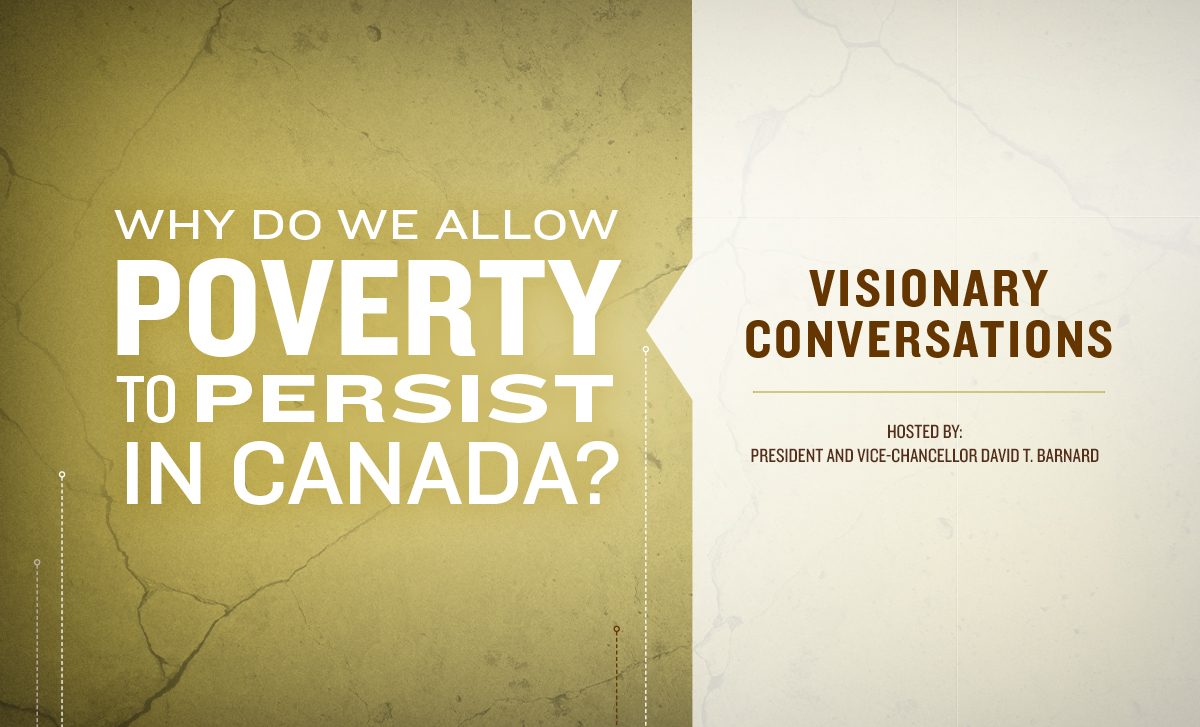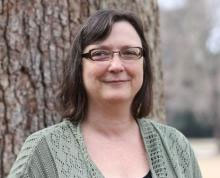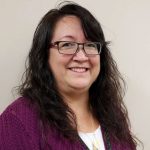
Why do we allow poverty to persist in Canada?
What role should corporations, individuals, governments and non-profit organizations play in reducing poverty?
President and Vice-Chancellor David T. Barnard hosts the next Visionary Conversations event on Thursday, March 9, which will examine the issue of poverty.
The panel will delve into several aspects, exploring the real costs of poverty, examining misconceptions and considering whether a minimum income program or other broad approaches could help.
What: Visionary Conversations
Topic: Why do we allow poverty to persist in Canada?
When: Thursday, March 9
Doors open: 6:30 p.m.
Discussion: 7 p.m. – 8:30 p.m.
Reception: 8:30 p.m. – 9:30 p.m.
Where: Brodie Atrium, Bannatyne campus, 727 McDermot Avenue
Community leaders will share their in-depth insight, discussing poverty in Manitoba and ideas to address it. Our esteemed panelists include:
Donald Benham

Donald Benham.
Donald Benham is the Manager of Hunger and Poverty Awareness at Winnipeg Harvest. He has been a journalist at the Winnipeg Sun and CBC Radio. He has also developed curriculum and taught at Red River College, University of Winnipeg and Canadian Mennonite University. Donald initiated and helped implement the B.A. (Communications), one of the first joint programs between RRC and U of W.
Donald has worked as political staff for the prime minister of Canada and the mayor of Winnipeg. He was a city councillor before joining Winnipeg Harvest in 2006.
Evelyn Forget

Evelyn Forget.
Evelyn Forget is an economist and professor in the Department of Community Health Sciences at the University of Manitoba.
The overarching question that guides her research is this: “How can we best ensure that everyone has access to the tools and resources they need to live a full life?”
She works in the areas of health economics and the history and philosophy of economics.
Her public policy work examines the relationships between poverty, inequality, health and social outcomes, as well as the impact of public policies on quality of life.
Edward Kennedy
Edward Kennedy is President and Chief Executive Officer of the North West Company. He is also Chairman and Chief Executive Officer of The North West Company (International) Inc.

Edward Kennedy.
Edward began his career with the North West Company in Alaska, where he worked from 1989 to 1997.
Edward was born and raised in The Pas, a northern Manitoba community. He holds an Honours Degree in Business from the Ivey School at Western University and a Bachelor of Laws Degree from Osgoode Hall Law School. He was the Chair of the 2011 Winnipeg United Way Campaign and is a past board member of several for-profit and non-profit organizations.
He currently participates on advisory committees for the United Way and the Build Winnipeg Partnership Taskforce. Edward is a competitive athlete and his other pursuits include public policy with a focus on socio-economic development.
Susan Prentice
Susan Prentice is a professor in the sociology department. She holds a PhD (York University), MES (York University), and BA (University of Toronto).

Susan Prentice.
Her research focuses on social inequality, systemic discrimination, and social change as they relate to public policy and advocacy on childcare. She is a member of the: Manitoba Commission on Early Learning and Childcare, Child Care Coalition of Manitoba, Table de recherche, Coalition francophone de la petite enfance du Manitoba, and Advisory Board, International Centre for the Mixed Economy of Childcare (ICMEC).
She also works closely with national childcare advocacy groups and campaigns, and regularly collaborates with trade unions. In 2015, she was one of the founders of Moving Childcare Forward: Research, Policy, Action.
Diane Redsky
Diane Redsky is executive director of the Ma Mawi Wi Chi Itata Centre. Ma Mawi translated from Ojibway means, ‘we all work together to help one another.’ The centre is a community-based, community-led, Aboriginal-driven family resource centre that is a leader in community-based care for children, youth and families in Winnipeg.

Diane Redsky.
Redsky is a band member of Shoal Lake First Nation #40 and has long worked to address the myriad of issues facing Winnipeg’s Aboriginal community in all areas all areas of health, justice, education and social services.
She has served in both a professional and volunteer capacity with local, national and international agencies and has become a strong advocate for Aboriginal children’s and women’s issues.
Through her leadership in several Aboriginal led community-based organizations, she has helped to create numerous innovative programs that have helped build healthy communities through promoting the growth and development of the urban Aboriginal community particularly the safety, protection and well-being of women and girls.
Read more about Visionary Conversations.
Follow the conversation on Twitter using #umvisionary







Would like to see an emphasis on job training and work expérience including more education in schools about what jobs are out there and finding a good fit for their personality. Another concern is affordable housing built in a village setting so people are not isolated and can get supports like day care and esl and job training.
Thanks for the comment. If you’re able to attend on March 9, audience members are encouraged to bring forward suggestions and questions for discussion with the panel.